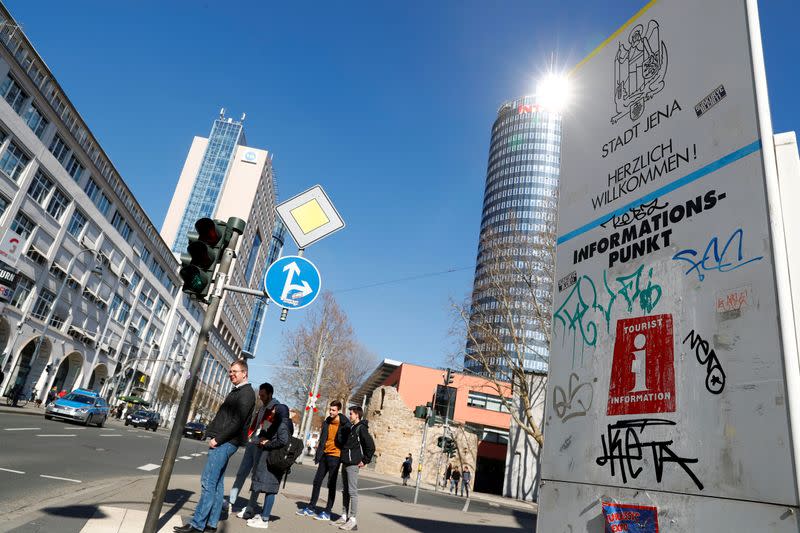German city introduces face masks for shoppers as coronavirus spreads

By Madeline Chambers
BERLIN (Reuters) - The city of Jena in eastern Germany has decided to make people wear face masks when shopping or travelling on public transport, stepping up efforts to curb coronavirus contagion and becoming the first city in the country to introduce the measure.
For the last two weeks, states around Germany have closed schools, restaurants, bars and banned public gatherings as they try to tackle the outbreak, but the number of cases and deaths is still rising fast.
Jena, which has 119 coronavirus infections and an overall population of about 110,000, decided to follow the example of Austria which on Monday said it was requiring shoppers to wear masks in supermarkets. The Czech Republic now requires everyone to wear masks when in public.
"In a week's time, wearing mouth and nose protection in shops in Jena, on public transport and buildings with public traffic will be compulsory," Jena City Hall said in a statement.
Given shortages of protective masks, the city in the state of Thuringia said towels or scarves wrapped over peoples' mouths and noses would be acceptable, and it encouraged individuals to sew their own.
The number of confirmed cases of coronavirus in Germany has risen to 65,166 and 648 people have died, according to the latest Reuters tally on Tuesday.
Health Minister Jens Spahn said there had been a slowdown in the daily increase in new cases in recent days, but added: "I think it will take until next week before we can make really clear statements about a trend."
Spahn said he saw no need for a national mask requirement "in the current situation", but he noted an increasing willingness among Germans to don face protection voluntarily.
As medical staff around the world clamour for personal protective equipment, many German companies, especially textile firms, have switched to producing protective face masks.
Finance Minister Olaf Scholz said he wanted to support the production of medical items in Germany and that money was available for firms to switch: "That can happen quickly."
Lothar Wieler, president of Germany's Robert Koch Institute (RKI) for infection diseases, said the discussion about face masks was relevant because they help stop the transmission of droplets that can spread the coronavirus.
In another sign of fall-out from the virus, the Bayreuth Festival organisers said the annual summer event, at which operas by 19th-century composer Richard Wagner are performed on a specially designed theatre, would be cancelled this year.
ECONOMIC FALL-OUT
German officials have stressed now is not the time to loosen social-distancing measures but politicians, fearful of the impact on Europe's biggest economy, are already debating how best to unwind the lockdown measures.
A health ministry spokesman said on Monday an obligation for the general public to wear masks may have a role to play later.
However, the premier of the state of Bavaria said the priority was to make sure medical workers have the protective gear they need and making masks compulsory for the public could cause supply bottlenecks.
Another option for later is to launch a smartphone app to help trace coronavirus infections, an approach pioneered by Singapore which German officials think could work without invading people's privacy.
With Germany's council of economic advisers warning the virus could trigger a 5.4% contraction in the economy this year, Chancellor Angela Merkel's government has announced a stimulus package worth more than 750 billion euros ($821.93 billion) to cushion the blow.
To avert a spike in unemployment, the government is extending a short-time work scheme which lets firms cut workers' hours while keeping them on the payroll. The Labour Office said some 470,000 firms had already applied for the state aid.
RKI President Wieler said he was optimistic the measures Germany had taken to contain the coronavirus pandemic were working and the situation would become clearer after Easter.
He also said, however, that he expected the mortality rate of 0.8% in Germany - very low compared with other large European Union countries like Italy and Spain - to rise, in part because more older people were now getting infected.
In a particularly shocking case, at least 15 people have died in one nursing home in Wolfsburg.
(Reporting by Madeline Chambers; Editing by Mark Heinrich)

